The Expanse is over; long may the Rocinante fly. The too-short season six winds things up with “Babylon’s Ashes,” which wraps up as much as it can—and teases stories it seems like The Expanse is never going to get to tell. But as endings go, this one is smart and stacked and satisfying.
Spoilers for the entire show follow!
Sometimes it seems like there are two camps of Expanse watchers: those who are in it for the characters, for the nuance and layers in how Earthers and Belters and Martians bounce off and work with each other, for the family on the Rocinante and the way their actions spread across the stars—and those who are in it for the action and plot and space battles. You can’t really have one without the other, of course. It would be a whole different show. But “Why We Fight” and “Babylon’s Ashes” feel a bit like two parts of one finale, one for each camp: the first part loaded with the quieter, incredibly meaningful moments between people, and the second packed with all the necessary action to get to a stopping point that works as a series finale.
Buy the Book


Sisters of the Forsaken Stars
It wasn’t until my second viewing that the heart of “Babylon’s Ashes” came through for me. Series finales are hard. They’re undoubtedly impossibly hard to make, but they’re also hard for viewers. They can never hit all the points everyone wants them to hit, and it’s a tough task trying to create just the right amount of closure, neither too pat nor too open-ended. There are always other ways a story could have ended—or, in this case, so many ways it could have gone on.
And it has been disappointing that this last season is so short. Yes, the finale is longer; yes, the showrunners and cast and crew have done an incredible job in this season, as for the previous five. But there’s so much depth and richness in this show, and in its source material, that it’s impossible not to wish for more of it.
Or, in some very rare cases, perhaps less of certain bits. I’m still not sure how I feel about the decision to include the “Strange Dogs” story here. As it wound up, with protomolecule-“fixed” Xan and still-human Cara running away from their parents and Duarte staring up at the ship being built in the platform in orbit around Laconia, I still felt like it was a trailer for a show we may never see. It’s not closure for the protomolecule narrative so much as it’s a door opening to another piece of that story— a door I would very much like to walk through.
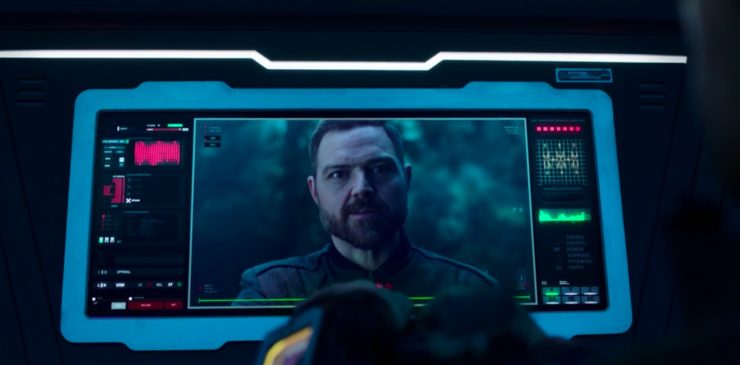
Teasing Duarte’s grand plan to go kill some gods is a little bit of dangling a treat and then snatching it away, but it does strengthen one of season six’s greatest narrative threads: the fact that it is never about Marco. It—meaning the conflict, the war, the bigger picture—has never been about Marco, really, but about everyone whose lives he’s touched, ruined, mocked, belittled, or wasted. It’s only been about Marco to Marco, and the show gave us his perspective for much of last season, then slowly turned, shifting to Filip, who struggles to understand himself as he drifts further and further from his father’s orbit.
When Marco shows himself, in the big multi-fleet battle, it’s in the cruelest, most despicable way: hiding away so that he can rain down hell on his fellow Belters. This has nothing to do with them turning their backs the Belt, but with them rejecting him. It’s personal, and it’s heartless, and it’s so ugly that it was all I could think about for the next ten minutes of the show. It’s a vicious and effective way to show, one more time, who Marco was all along. Drummer’s fleet can’t kill him, but Liang Walker uses his last breaths to at least damage the Pella—and take out Rosenfeld, a loss to which Marco is frighteningly indifferent. His attempt to rally the troops is as transparent as can be; when has Marco ever chanted “Beltalowda”? He only cares for chants of his own name.
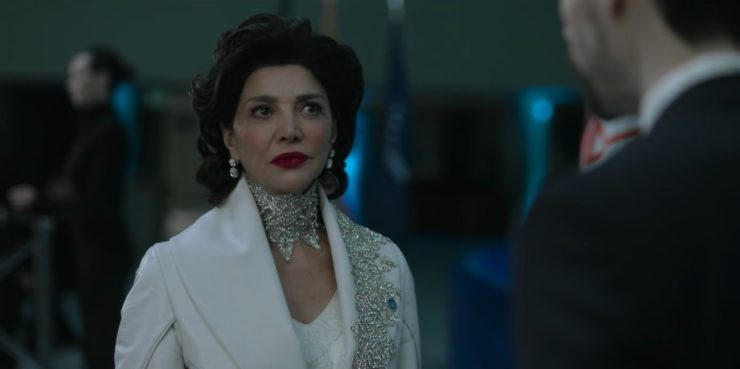
There is too little Avasarala in this episode, but then, there is never enough Avasarala for me, and what we do get is perfect: her meditating in her room on the Zenobia, her moment with the junior officer who’s worried about her presence; the way she tries to control her face when Holden makes his last very Holden move, in front of her and the Belt and everyone. Has she ever worn white like that before? She is the embodiment of peace, even while she’s still threatening Holden with politics. Shohreh Aghdashloo is a treasure, and I hope she’s in every space epic from here until the end of time.
Everyone gets a moment in this finale—a chance for us to remember how far they’ve come and how much they’ve lost, all of it precision-crafted by Ty Franck, Daniel Abraham, and showrunner Naren Shankar. Holden and Bobbie talking about Alex (who’d argue with Martians who claimed the Roci was still a stolen Martian ship) was a lovely way to bring in a character we didn’t need to lose so soon. Clarissa saying “I didn’t use my mods” with that note of pride in her voice. Amos making a big hero gesture while saying it’s just about preferring to die face to face with the enemy. Bobbie Draper, rockets shooting out of her power armor like they were when we first met her in a training exercise on Mars. Naomi understanding that she ought to give Clarissa the same grace she wanted to give Filip. (And her moment with Amos, where they’re finally okay!) Holden acknowledging that this time, they’re killing Marco. This time no punches will be pulled.
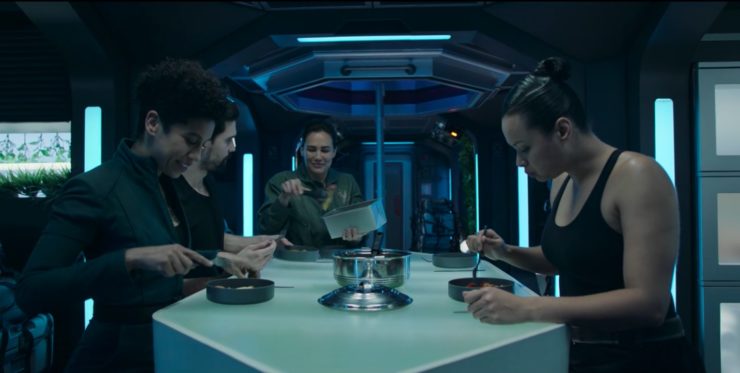
It was extremely clever to keep the shipping-container plan from the audience (though some cheeky bastard did put a shot of it in the trailer for this season; you just don’t know what you’re looking at unless you already know what you’re looking at). Like the Pella reveal, the beginning of the ring station assault is breathtaking, a beautiful image of something absolutely horrible. So much is going on, and director Breck Eisner has a handle on all of it: on the names blinking out on the Roci’s screens, on Amos and Bobbie rattling around in their tiny tin cans, on the rail gun and the Roci and the many, many ways anyone could die in that attack. (That assault team includes an “Idaho, D.” and a “Ripley, E.” They really brought in the big guns.)
There’s a lot of beauty in the unexpected here—in Holden flying the Roci around the edge of the ring space, just ahead of the rail gun fire; in all the colors of the shipping containers and the sheer bravery of every single person who was willing to climb into one of those. (If I have one complaint about how this finale looks, it’s that some of the effects as Amos plummets toward the station are not quite up to par.)
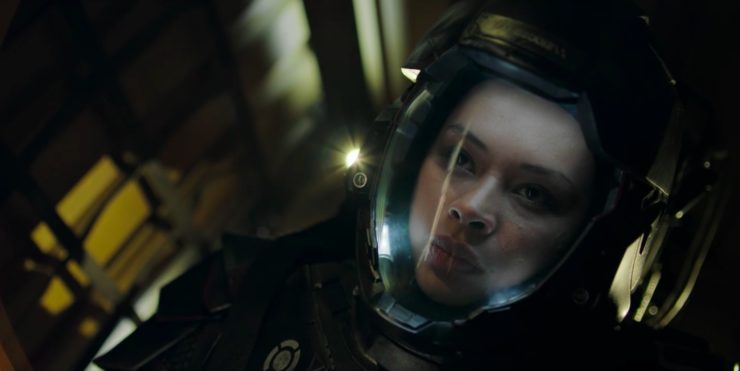
I tend to love the final seasons of my favorite shows, even when (and sometimes because) they’re flawed. They often have an elegiac quality; a mix of hope and loss, love and leaving, that seeps through their scenes. “Babylon’s Ashes” is a story in which a quiet and meaningful triumph is found in the depths of defeat. Plans fail: Marco tricks the fleet, and the ring station plan goes awry when Bobbie has to blow the whole thing up in order to save them all. And when Naomi figures out how to use the ring gates to get rid of Marco, she does so at incredible personal cost. Naomi has done all the log-reading, all the homework, spoken to the expert, solved the question of what triggers the ring entities—and has to use that knowledge to end her enemy and her son.
I’m not sure the show spends quite enough time acknowledging the weight of this. Given how much time we spent on Holden’s unwillingness to kill Filip, I think we needed a moment where everyone who pushed him on that understands what Naomi chooses to do. I want to see it matter to Amos and Bobbie. They’re the first people we see after Marco’s ship gets eaten, but they look happy and relieved, not like they know what this cost Naomi. Everyone has taken heavy losses, but this is something else, and there’s not quite room for the gravity of it.
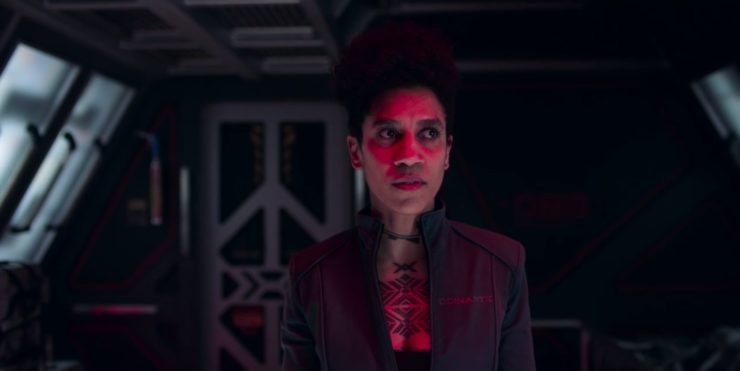
At least the cut to the negotiating table is as gentle as it can be. There’s just enough back-and-forth here to remind us how long these conflicts have simmered, and how repetitive they get, and that somehow, everything always comes out in Earth’s favor.
What Holden does in the end, finally, brilliantly, is make a giant decision with repercussions for all of humanity—after talking to the people it’s going to affect the most. He doesn’t drop the presidency into Drummer’s lap without her consent and her acceptance. He takes power for the sole purpose of giving it up again. It’s something Avasarala would never expect because it would never cross her mind, and she immediately wants to fight him on it. But I think she’s too smart to undo it. It would undo every single thing they fought side by side for, and every single thing Drummer said when she named exactly what has always been done to the Belt:
“I will not be reasoned back into my place. Belters are promised a future so long as it remains convenient. We are given a voice so long as Inners control the comm. We have a vote so long as we can be voted down.”
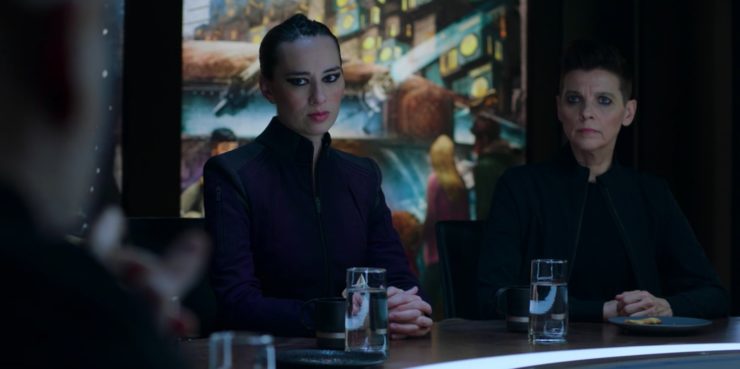
Sometimes you have to break the system to make it truly work for everyone. Sometimes the person with power has to be willing to give that power up. Some systems need to be entirely unmade and rebuilt so that they actually serve the people they are meant to serve. The Expanse, in the end, is a story about doing that—about breaking things to make them better, and about what it really takes to make a better future. Sacrifices are required, and I don’t mean giving up plastic straws. I mean being willing to consider all our systems and who they actually serve.
The Expanse is also a story about a bunch of random people thrown together by strange twists of fate who grow into a family and wind up saving the day a whole lot. They’ve been through so much, from the Cant to Eros to the Behemoth to Ilus to a post-apocalyptic world—and to one more eve-of-battle dinner together on the Rocinante. (An absolutely perfect scene, that one.) But this show is always at least two things. In the same way that it’s space politics and action and it’s a character drama, it’s a story with a huge scope and big stakes and an intimate story about how we can be better, piece by piece, person by person. Systems need changing, but people do, too. And Naomi gets the last word on that when she tells Jim he did the right thing:
“You did. You followed your conscience in the hope that others would follow theirs. You didn’t do it for a reward or a pat on the head. The universe never tells us if we did right or wrong. It’s more important to try to help people than to know that you did. More important that someone else’s life gets better than for you to feel good about yourself. You never know the effect you might have on someone, not really. Maybe one cool thing you said haunts them forever. Maybe one moment of kindness gives them comfort or courage. Maybe you said the one thing they needed to hear. It doesn’t matter if you ever know. You just have to try.”
As she talks, we learn what Naomi will never know: Filip left the Pella. He’s Filip Nagata now, and he’s Filip Nagata because she did what she could with him: She tried.
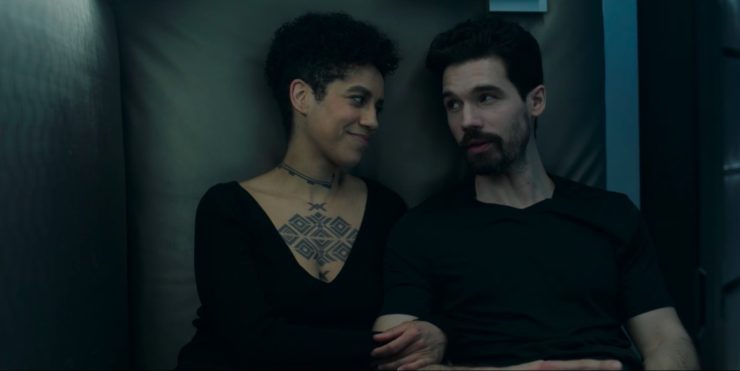
I don’t want to call Naomi Nagata the heart of The Expanse, because this is a show with a lot of heart to go around. But Naomi has been an engineer in more ways than one. Think of her talking Lucia down in season four, or her desperate plan to save her friends–and maybe herself—last season, when she was trapped on a rigged-to-blow ship. She puts things together. She does math-math and people-math. Her friendship with Drummer has been a constant, and that too is something that’s mattered, on story and character levels, again and again. She’s the one who figures things out and figures people out, while Amos is Amos and Holden makes sweeping decisions because he’s the captain and he has to. She was a great character on the page, and Dominique Tipper brought even more layers to her. Her whole arc, from prickly and defiant to strong and certain and wise, is a gorgeous, resonant slow burn.
Sometimes I think about an early ad for The Expanse, a poster I saw everywhere that showed Julie Mao floating in space with a tagline that read “We’ve gone too far.” This made it sound like The Expanse was another story about how space is scaaaaary, how we should be afraid of whatever else is out there. I didn’t want to watch the show that those posters seemed to be advertising. But I’m so glad I watched The Expanse, which is something else entirely.
What wasn’t clear, back then, was that it was the “we” that mattered. We as in people. We as in the people who took alien technology and immediately tried to make weapons out of it. We as in humanity, replicating the cruelty and oppression of Earth on a system-wide scale. And we as in the people who can still change, still make better choices, still learn when to make decisions and when to step aside. The Expanse is bleak and it’s hopeful, and this ending is in keeping with how the books end—lighter, with fewer losses, but with just the right tone.
I’m really going to miss this show.
Molly Templeton lives and writes in Oregon, and spends as much time as possible in the woods. Sometimes she talks about books on Twitter.










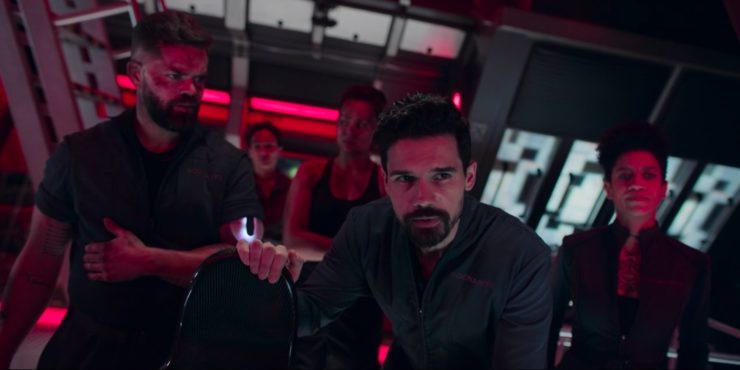
I finished the show and the books, but my brain is screaming for more still.
It’s a real shame that it ends here, when the protomolecule story is just starting to get interesting again. I always felt like the whole Marco’s War plot sidelined what was for me the most interesting part of the show. Oh well. I still really enjoyed it.
It was a great finale to a great series.
I could have done with more Laconia (is there a spinoff in the works, I wonder?), but otherwise I can’t fault it, even though I would have loved at least a few more episodes.
And yes, Naomi is at least a big part of the heart of the series, and yes, there’s a lot of heart to go around.
And also yes, I needed more Avasarala. I could watch entire seasons of Avarasala strutting around in fabulous getups and rasping outrageous curses at random people. She is one of the greatest characters in a series chock-full of them, and Shohreh Aghdashloo steals every scene she’s in. (And who can forget the moment when someone comes back to the Rocinante from meeting with Avasarala, and the first thing Amos asks is “What was she wearing?”?)
P.S. I hope that, at some point in the not-so distant future, Naomi learns that Filip Nagata is still out there.
Let’s hope they somehow adapt the last 3 books to tell the story of Laconia.
Other names in the strike team: Vasquez, Hudson, Hicks. What a great finale of what could well be the best sci-fi series we’ll ever see.
It’s already been confirmed by one of the Motion Graphics Supervisors posting on Reddit that almost all of the assault team names are referring to Sci-fi characters.
https://www.reddit.com/r/TheExpanse/comments/s3rz67/big_scifi_easter_egg_in_the_final_episode_spoiler/hsmm1ht
Many of the effects during the assault sequence looked like a video game. But in general, through the whole series, what was shown on screen looked good and served the story, making sense of the physics of the battles. It was a refreshing change from the norm in genre shows where the special effects don’t usually match the story the script is trying to tell.
The soldiers in shipping containers, and the “you say good hunting,” exchange were Battlestar Galactica homages, no?
The visual language of the space scenes is very reminiscent of BSG, with the shaky cam and snap zooms and all.
Great finale. I hope we get more somehow.
Another great review, Molly.
I missed the Duncan Idaho and Ellen Ripley references, but I think that is a cool homage. I will have to rewatch.
This show was a great ride.
I, too loved that kitchen scene. For a second I thought Bobbie died, but I am glad she survived. And Camina Drummer shined again. Well done by Cara Gee. :)
It felt more like a midseason finale than a series finale. Too many hanging plot threads. T
On the plus side, out of all recent shows I’ve watched, this is the only one that I’m sure would’ve been better with more episodes. Because they’ve already proven they can tell a good story.
They just needed more time.
I’m glad I watched this series. It really was something great. Well done, everyone!
Since there is a time jump in the books, I wonder if they’ll make the Laconia series when a few years have passed (in the real world) and the actors are a little older.
I still don’t have the last book (#9) but plan on getting it soon.
I wish they had done all the books but a little bit of me is glad they stopped before killing off Aveserala and Bobby.
Such a bittersweet ending. Having lost an adult son myself (although certainly not through my own choice) I found myself breaking up during these scenes with Naomi. Once we saw Filip had survived, it left me wondering whether we hear more about him in the followup books…anybody want to add a spoiler?
This show has been both smart and stylish. I wish Amazon would agree to keep it going somehow, even though apparently the books turned a corner and continued in a different way?
As a fan of the books, I have really enjoyed what this show has done with them over the six seasons…and it feels right to me to end it here (at least for now). Book six ended similarly, with lingering questions but a certain sense of resolution. We find that things have changed a lot when book seven begins, both in terms of the politics of humanity and the age of our main characters, and I think it would work well to begin anew at that point in the narrative.
I would be very, very surprised if at some point in the not too distant future, the mantle isn’t picked up again with an adaptation of the final trilogy. Perhaps with some o the same actors, appropriately aged, perhaps some re-cast for various reasons. I look forward to that when it happens, and hope the treatment is done at least as capably and thoughtfully as this series.
I’ll be rereading the first three books… Then move on to the final six I haven’t yet read. It’s not over just yet for me :)
Thank you for these reviews, Molly.
The season finale left me disappointed rather than satisfied, and I’m not entirely sure why. The Good Place and Dark season finales left me happy and content (I assume) due to closure. On the other hand, I really enjoy movies and TV that leave more questions unanswered (e.g. Twin Peaks).
I was deeply disappointed with the finale of the Wheel of Time, but that felt like a different kind of disappointment.
In the end, I think I’m simply sad that one of my favorite TV shows ended with what felt like a a check-off from a to-do list rather than a highly inspired conclusion.
Excellent review, but for the fact that you seem to have missed Naomi’s scream. Yes, it’s quick, but they definitely acknowledged what she assumed she was sacrificing. And then, overlaying Filip’s escape with Naomi’s speech to Holden was one of the major improvements from book to screen.
read the synopsis of episode, it said season not series finale
Thank you for these reviews — and oyedeng (goodbye), The Expanse! This series was not perfect, but it did *so many* things right: from the more realistic physics, to the diverse cast, to the non-conventional-heroism decisions of the characters, to not becoming the planet-of-the-week show when it could have but focusing on the solar system consequences. A large part why I love this show so much is the politics of it, with the rise and fall of empires, and the attempt at building a show with a clear throughline from start to finish. Few shows ever attempt this, let alone making that vision into reality. Really, the only other point of comparison I can think of is Babylon 5.
It was a joy covering this show in obsessive detail tracing the callbacks to earlier plot points and looking at the additional info on displays. I hope its reputation grows in the future, it’s well worth it.
The ‘Strange Dogs’ inclusion was just bizzare.
It did not contribute to the main story in any meaningful way, and just meant we got to spend less time – in an already truncated season – with characters whose stories we actually care about.
I enjoyed the rest of the season but this just felt like the producers owed some actors a favor. I’ve only read the first book, so I was expecting some sort of grand payoff but we got… nothing?
With “Rico, J” on the strike team, we even got a nod to one of the grand masters. I just really hope it was in homage to Heinlein’s novel, and not the movie version.
“Sometimes you have to break the system to make it truly work for everyone. Sometimes the person with power has to be willing to give that power up. Some systems need to be entirely unmade and rebuilt so that they actually serve the people they are meant to serve. The Expanse, in the end, is a story about doing that”
One way to look at it. I see it as a story about all the different ways that humans can approach problems – and how all those different ways need to be. Oh, and about how the toughest, most screwed up, are the ones that survive (if you’ve finished the books, you know what I mean).
Beautiful eulogy, almost perfect. I have yet to repeat the finale, savoring the memory before rewatching. This “finale” leaves so much to the imagination that it cannot be an ending.
I’m crushed that this show is over. Rarely do we get such spectacular sci-fi, so well acted, art directed, and executed. Battlestar Galatica was maybe the last? I wish we could get a clear answer on why they are ending knowing that there are two books they could do. I have not heard a definitive reason for it ending and an hoping that we get a movie or two or some kind of spin-off, etc. I will truly miss a shirtless Holden moment as well. Fingers crossed.

Article nails it. My son and I watched the show together. Bobbie and Amos are our favorites.
Did Bobbie take Amos up on his offer, though?
I was dubious on how they’d choose to finish this season/series – expecting to to become a GoT at any moment. Instead they stuck close to the timeline of the books and decided not to tell the Laconia arc in less than 6 episodes a wise decision that the completist in me wanted but knew was never feasible. Instead we got a great 6 episodes telling us the end of Marcos war and bringing it to a hopeful close with barely a foot put wrong.
Apart from the out of place Strange Dogs storyline everything else was a masterclass in how to do a book to tv adaption right. It quickly became its own thing equal to but somehow fractionally more separated than GoT was from its bookish parent.
Massive kudos to Ty, Naren and Daniel they did double plus good. Phenomenal casting too!
My only gripe in the finale was the way that Avasarala had to have things explained to her by Holden after he stepped down as president of the Transport Union. It seems to me that she would have seen what he had done, and why, and that there was no way to undo it without courting disaster, in a matter of moments. It was really the one note that felt like it was off, though, and if that’s my only issue, well, they did pretty damn well.
It was such a great show in its own right, to say nothing of the difficulty of adapting amazing source material. It always felt true to the spirit of the books without trying to cover every event from them, and that’s a tough balance to strike. I’ll miss the show, and the books, quite a bit.
I love this series. All my fears and concerns vanished by the first 5 minutes into the first episode. They did such a magnificent job.
As I was watching the last episode, I could feel myself tearing up knowing that this was it. It was over. No more new episodes, no more eagerly waiting for the next sesaon.
I’m going to miss this show, too.
@@@@@ 28: I hear you.
The way I read that scene, though, it was less that she needed Holden to explain things to her and more like she needed to hear him say it out loud, to her face.
One way or the other, it is mostly played for the benefit of the viewer.
I am only starting to read the books now that the series is played out, but I read “Strange Dogs,” and found the adaptation of it (the season 6 Laconia subplot) amazingly well done.
@@@@@ 21: I, too, found the Laconian subplot strangely incomplete and disconnected.
But, upon reflecting on it, I think it is a way to include something about the protomolecule in a show that was basically hijacked by Marco Inaros and his Eyelashes.
True, the Belters’ discontent is one of the main themes of the whole series, but the protomolecule was to The Expanse what the White Walkers are to ASOIAF, so it had to be included in some way.
@26 And here I was thinking that it was only me left with that question! Considering what we saw of her time on Mars after her service, I’d say yes, but knowing Amos I still need confirmation…
Great synopsis and it truly made me rethink waiting on a re-watch. I came to the series at season 3, and really do hope that there will be more.